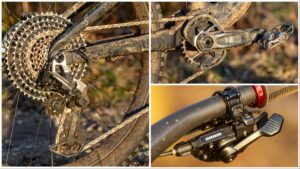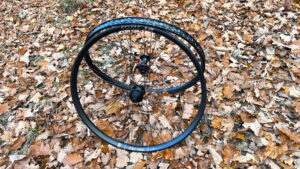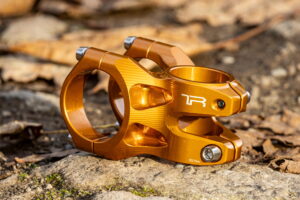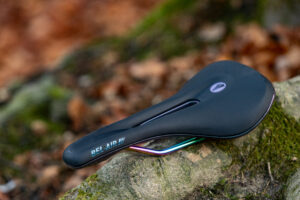Balancing power and weight in a thrilling package, the Forestal Cyon is at the cutting-edge of trail bike tech
Forestal Cyon Neon e-bike review
A newcomer on the scene, young upstart Forestal is aiming to mix it up with the best electric mountain bikes on the market. And in this test we take a look at its trail bike offering; the Cyon against three of its peers (see below).
Need to know
- Lightweight e-bike with 150mm travel, front and rear
- 60Nm torque from the Bafang-built EonDrive motor, paired with a 360Wh battery
- Carbon frame with asymmetric reinforcement strut, single pivot swingarm and linkage driven shock
- Full colour display integrated into top tube gives GPS mapping and enough data to make your head spin
With only three models, the Forestal range is pretty easy to navigate. It’s an e-bike only brand from Andorra where the Hydra is the full-power bike, the Siryon is the 170mm travel mid-power bike, which we’ve already tested, and the Cyon is essentially a 150mm trail bike version of the Siryon.

The Forestal-tuned Bafang motor is not short of power or torque, but with a high-pitched whistle, it sounds like a kettle boiling
Forestal then splits each platform into tiers, lowest to highest as follows: Halo, Neon and Diode, so the Cyon Neon tested here is the mid-range, mid-powered, mid-travel model. Simple, right? It shares the exact same full carbon frame as the other two bikes in the Cyon lineup, a frame that’s designed around a powerful 60Nm Bafang-built EonDrive motor (1.95kg). Geometry and sizing is modern for a 150mm travel 29er trail bike, bar the 480mm seat tube length that limits the amount of drop you can run on your seat post.
Also, it rides a little high in its travel and is the only bike in this test without geometry adjustment. So we’d like to see Forestal add a low geometry setting to bring its vital stats a little closer to the Trek Fuel EXe, which has arguably the best geometry of the mid-power bikes we’ve tested.

We love the integrated display on the top tube, and it’s packed with features, but it takes a while to boot up and suffered from the odd glitch during its time with us.
With a bright, clear display nestling in the top tube the user interface on the Forestal is certainly hi-tech, but takes longer to boot up. It has GPS for maps and tracking, so if your bike gets stolen you should be able to find it as easily as tracking down your phone. The handlebar remote offers five modes – off, walk, eco, sport, race and nitro.

Forestal’s control unit is low-profile, but the buttons have no clicks or feedback, so you don’t always know its got the message.
Powering all of the electronics on the Cyon and tucked neatly inside the down tube is a 360Wh battery (1.8kg). Forestal will also offer a 250Wh aftermarket range extender when it’s ready, bringing the total battery capacity to 610Wh. And while that sounds like a lot of juice, the Forestal is one energy hungry bike. As such, it fared worst in our range test, only just offering an hour of ride time before the lights went out. So you’ll need the range extender, once available, if you plan on venturing further afield.

Twin Levity linkage is discreetly hidden behind the swingarm.
Which raises an interesting dichotomy. The 250Wh range extender is going to weigh roughy 1.5kg, which will bring the total weight of the bike close to 20.5kg. So almost the same as the lightest full power e-bikes, but still with less range and less power.

The shock extender drives a RockShox Super Deluxe shock and the feel is sporty rather than plush.
Suspension
The 150mm travel Cyon shares a similar suspension layout to the 170mm Siryon, but that’s not to say the Cyon is simply a shorter travel verison of the Siryon. Far from it. By manipulating the main pivot height and the Twin Levity linkage layout, Forestal has made the Cyon less progressive than the Siryon while also increasing the amount of anti-squat to improve pedalling efficiency. Now, if you’re reading this and screaming, “it’s got a bloody motor, who cares about anti-squat?” we hear you. But we suppose Forestal was thinking about how the bike pedals when you’re above the level of assistance or when the battery runs out. And the latter is a real concern on the Forestal. Ultimately, the suspension on the Cyon did not feel as good at ironing out chatter and providing traction as the Siryon, and we don’t think it’s simply due to the RockShox Super Deluxe Ultimate shock. Yes, running the shock softer meant the bike felt plusher off the top and held better straight line speed through the roughest sections of trail, but then it did hold its shape as well in corners, even when we increased the low-speed compression damping. So we went back to the firmer set up.

RockShox Pike Ultimate fork matches the rear suspension character and saves a few grams over a Lyrik.
In keeping with the more sporty suspension feel of the frame, Forestal has fitted a 150mm travel RockShox Pike Ultimate fork. It saves about 140g in weight over a Lyrik, but given the overall weight of the bike and its intended use, we think the plusher and stiffer Lyrik would been a better option.

We had no complaints with the Magura MT7 brakes – powerful, comfortable and easy to modulate.
Components
The stock 2.3in Maxxis tyres sit a little square on the wide Crankbrothers Synthesis carbon rims, so we’d upgrade both. Ideally to a 2.5in front paired with a 2.4in on the rear. We’d also go with EXO+ casings, or similar, as the stock EXO casing is too flimsy on a 150mm travel bike that weighs almost 19kg. And the benefits of switching the tyres would be twofold. The increased volume would drive up grip and comfort, while the tougher casing would drive down wasted time fixing punctures. Also the sluggish 17.14º freehub engagement of the Crankbrothers E7 rear hub is really noticeable on more stop/start trails, so we’d change that too.
We loved the feel of the Magura MT7 brakes, the kinked one-finger lever blades offering a better lever position and feel than the straighter blades on the MT7s fitted to the Specialized S-Works Levo SL. Even the smaller 180mm rear rotor never got overwhelmed. Magura’s integrated clamps have to go though, because if you run your levers anywhere close to flattish, the SRAM X01 shifter pod and dropper remote are both tucked too far under the handlebar for easy use. So while separate clamps wouldn’t be as neat, they will be way more functional.

Safe to say we’re not the biggest fans of headset cable routing.
And while we’re talking functionality, can brands please stop making complicated stem, spacers and top-caps that only look cool when you have all of the spacers stacked under the stem? Just stop. Please.

The Forestal Cyon was a blast to ride… while the battery lasted.
Of the four mid-powered e-bikes in this test, the Forestal Cyon is easily the closest in terms of motor performance to a full-power e-bike
Performance
Of the four mid-powered e-bikes in this test, the Forestal Cyon is easily the closest in terms of motor performance to a full-power e-bike. And not simply because of its impressive 60Nm torque or 400W peak power. No, the compact Bafang-made motor also provides a decent amount of overrun, which makes getting the Cyon up and over technical sections of steep climbs that much easier, or at least attemptable. The extra grunt is also handy for powering your way through soft, boggy sessions of trail without getting, well, bogged down.

There’s a generous reach, but the BB and seat tube are too tall.
The level of support is somewhat deceptive though, because while it allows you to soft pedal on gradual gradients and let the motor do most of the work, the opposite seems true when you really drop the hammer on steep climbs, possibly due to the increased cadence. You change gear less on the Forestal than on the other bikes too, so it also feels more like a full power e-bike in that regard.

Forestal’s Bafang motor has stacks of power and makes mincemeat of technical climbs.
So those are its strengths, but it also inherits some of the weaknesses of full-power e-bikes. It’s the one of the noisiest bikes here, the stovetop kettle whistle a constant companion on every ride, at least until you stop pedalling or punch through the 15.5mph sound barrier. With the motor off, the bike is as silent running as any. Get above the assistance limit however and you also notice the additional resistance in that motor. It’s not like pedalling through treacle, but it definitely requires more rider input than on the other bikes. And if we had to guess, we’d say it’s the increased drag of the motor and impressive power output that puts the extra drain on the 360Wh battery.
E-bike comparison chart
For our power-hour challenge, we put all four bikes in max power mode, be that boost, Rocket, level 3 or Nitro. We then rode the same test loop where the bikes were fitted with the same tyres, ridden in the same conditions, by the same rider. The results were surprisingly different though. The loop consisted of one steep technical climb, two fireroad climbs and a few Tarmac climbs, depending on the bike. We recorded time and elevation to limp mode, typically 10% battery life, then rode until the lights went out.

Pivot Shuttle SL V Levo SL V Forestal V Trek Fuel EXe range comparison
Probably the most telling metric of all is the number of trails ridden. On the Pivot shuttle SL we completed 7 descents, which is almost doubt that of the Forestal. We also used the estimated calorie burn as a proxy for effort, where the calories burned per metre for elevation gives a good indication of rider input on each bike. The Specialized Levo SL required the most rider input, the Forestal Cyon the least.
Verdict
Having been impressed by the 170mm travel Forestal Siryon, we had high hopes of the 150mm Cyon. Unfortunately it didn’t quite deliver. The suspension and geometry didn’t feel as good overall and when combined with the limited range, it makes less sense as a trail bike. We’d also like to see faster freehub engagement, wider, tougher tyres and probably a RockShox Lyrik fork instead of the Pike. For a modern bike, the seat tube is also too tall. So while Forestal’s pricing and power output look impressive, you’ll need to factor in the additional cost and weight of the 250W range extender, otherwise you’ll not get very far on the Cyon.
















